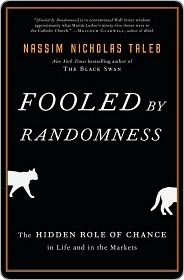More on this book
Community
Kindle Notes & Highlights
Started reading
August 3, 2022
Probability is not a mere computation of odds on the dice or more complicated variants; it is the acceptance of the lack of certainty in our knowledge and the development of methods for dealing with our ignorance.
Clearly risk taking is necessary for large success—but it is also necessary for failure.
Most journalists do not take things too seriously: After all, this business of journalism is about pure entertainment, not a search for truth, particularly when it comes to radio and television.
Black swans, those rare and unexpected deviations, can be both good and bad events.
In addition we seem to have evidence that what is called “courage” comes from an underestimation of the share of randomness in things rather than the more noble ability to stick one’s neck out for a given belief. In my experience (and in the scientific literature), economic “risk takers” are rather the victims of delusions (leading to overoptimism and overconfidence with their underestimation of possible adverse outcomes) than the opposite. Their “risk taking” is frequently randomness foolishness.
we often have the mistaken impression that a strategy is an excellent strategy, or an entrepreneur a person endowed with “vision,” or a trader a talented trader, only to realize that 99.9% of their past performance is attributable to chance, and chance alone.
this book has two purposes: to defend science (as a light beam across the noise of randomness), and to attack the scientist when he strays from his course (most disasters come from the fact that individual scientists do not have an innate understanding of standard error or a clue about critical thinking, and likewise have proved both incapable of dealing with probabilities in the social sciences and incapable of accepting such fact).
They believe in reason and rationality—that we should overcome cultural impediments on our way to becoming a better human race—thinking we can control our nature at will and transform it by mere edict in order to attain, among other things, happiness and rationality.
the Tragic category: We are faulty and there is no need to bother trying to correct our flaws. We are so defective and so mismatched to our environment that we can just work around these flaws.
As an empiricist (actually a skeptical empiricist) I despise the moralizers beyond anything on this planet: I still wonder why they blindly believe in ineffectual methods. Delivering advice assumes that our cognitive apparatus rather than our emotional machinery exerts some meaningful control over our actions. We will see how modern behavioral science shows this to be completely untrue.
Solon was wise enough to get the following point; that which came with the help of luck could be taken away by luck (and often rapidly and unexpectedly at that). The flipside, which deserves to be considered as well (in fact it is even more of our concern), is that things that come with little help from luck are more resistant to randomness. Solon also had the intuition of a problem that has obsessed science for the past three centuries. It is called the problem of induction. I call it in this book the black swan or the rare event. Solon even understood another linked problem, which I call the
...more
How journalists are bred to not understand random series of events.
This is one of the many reasons that journalism may be the greatest plague we face today—as the world becomes more and more complicated and our minds are trained for more and more simplification.


